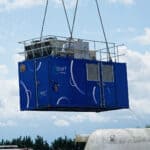With over £100 million in government funding, five new quantum research hubs are poised to revolutionize healthcare, cybersecurity, and transportation. These hubs aim to develop cutting-edge quantum technologies, leading to advancements such as faster clinical scanners, secure communication networks, and next-generation navigation systems. By combining clinical expertise with business resources, these hubs will drive innovation in quantum technologies, directly impacting healthcare, security, and clean energy. The government’s initiative to boost economic growth through the development and export of these technologies aligns with its mission to rebuild Britain. In healthcare, quantum technology promises breakthroughs in diagnostics with quantum-enhanced blood tests, MRI scanners, and clinical treatments, potentially leading to earlier disease detection and improved patient outcomes, thereby alleviating pressure on the NHS. Additionally, these hubs will focus on national security, researching technologies resistant to GPS jamming and developing a ‘quantum internet’ for secure communication networks, safeguarding sensitive data and infrastructure. The hubs, led by prestigious UK universities, will collaborate with industry partners to translate research into practical applications. These include the UK Quantum Biomedical Sensing Research Hub at UCL and Cambridge, the UK Quantum Technology Hub in Sensing, Imaging, and Timing at Birmingham, the Integrated Quantum Networks Hub at Heriot-Watt, and the UK Hub for Quantum Enabled Position, Navigation, and Timing at Glasgow, each advancing specific quantum technologies for a safer, healthier, and more secure future.

With the support of over £100 million in government funding, five fresh quantum research hubs will lead to advancements in healthcare, cybersecurity, and transportation.
Through the development of these revolutionary new quantum hubs, faster clinical scanners, secure communication networks, and next-generation navigation systems are set to be advanced.
They will bring researchers and businesses up to use their clinical expertise and talent, alongside business know-how and resources, to develop groundbreaking quantum technologies that will directly impact people’s lives in areas like healthcare, security, and clean energy.
The role of quantum technology in healthcare innovations
The new quantum hubs will aid in the government’s initial effort to encourage economic growth by developing new technologies for hubs that can be sold and exported to increase GDP.
Also, by innovating in the science and technology industry, advancements will support the delivery of the government’s mission to rebuild Britain.
Quantum technology will enable the construction of a more effective NHS that is capable of future-proofing cybersecurity and keeping our streets healthy.
These new hubs will be centres for advancements in areas like quantum-enhanced blood tests, faster MRI scanners, and innovative clinical interventions and treatments.
This could lead to earlier clinical care, allowing for earlier detection of diseases like cancer, and possibly saving lives.
In the end, these innovations may improve the outcomes of patients and lessen the strain on our dedicated NHS.
The hubs will guard crucial elements of regional security.
The quantum hubs will even research technologies that are essential to national security. This could result in increased positioning systems that are resistant to GPS jamming, or submarines that can operate for extended periods without relying on satellites.
Also, research into a ‘ quantum internet ‘ could create safe and future-proof communication networks, safeguarding sensitive data and communications infrastructure – helping protect citizens and the economy.
Secretary of State for Science, Innovation and Technology Peter Kyle explained:” We want to see a future where cutting-edge science improves normal lives. By supporting the deployment of technology that will allow for faster diagnosis of diseases, secure critical infrastructure from hostile threats, and cleaner energy for us all, that is the purpose behind our investment in these new quantum technology hubs.
Leading university research
The five fresh hubs will collaborate closely with industry partners and be led by renowned universities across the UK. This collaboration makes sure that research is translated into useful public-facing applications in real life.
The hubs of quantum technology are:
- The UK Quantum Biomedical Sensing Research Hub ( University College London and the University of Cambridge ) investigates quantum sensors for diagnosing diseases with sensitivity, including swift blood tests and medical scanners to aid in the early identification and treatment of conditions like cancer and Alzheimer’s.
- UK Quantum Technology Hub in Sensing, Imaging and Timing ( University of Birmingham ): Focuses on the development of quantum sensing for practical applications – brain scanners for dementia, cancer diagnostics, and advanced security and infrastructure monitoring.
- Integrated Quantum Networks Quantum Technology Hub ( Heriot-Watt University ): Aims to deliver the technologies for a future UK-wide’ quantum internet’, enabling future-proof cybersecurity and powerful distributed quantum computing.
- Develops technologies for building quantum computers, advances UK capabilities across hardware and software, and targets applications in a wide range of industry sectors.
- The UK Hub for Quantum Enabled Position, Navigation and Timing ( University of Glasgow ): Creates quantum-based positioning and navigation systems for critical infrastructure, autonomous vehicles, and improved indoor and underwater navigation.
The UK government’s investment in these quantum hubs demonstrates a commitment to developing technologies that have a direct impact on people’s lives.
From revolutionising healthcare to bolstering national security, these hubs have the ability to shape a safer, healthier, and more secure future for all.












